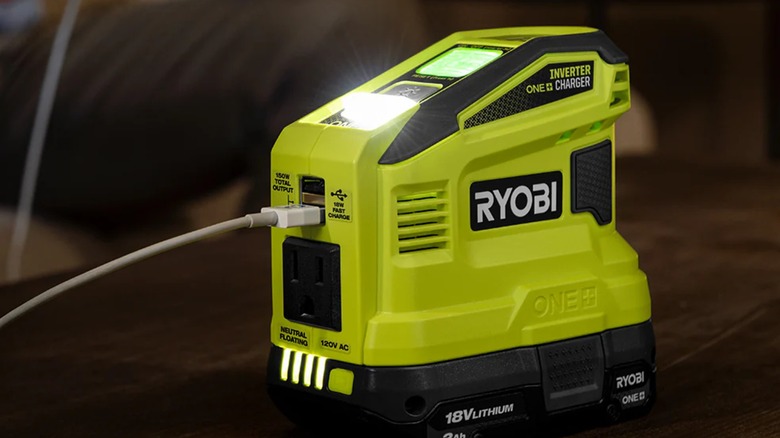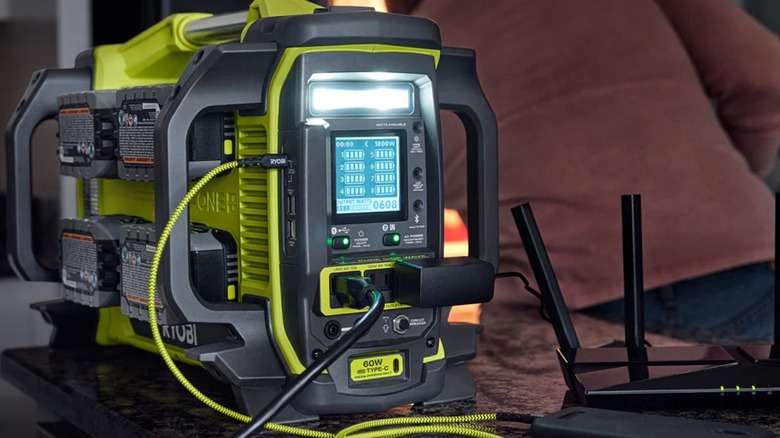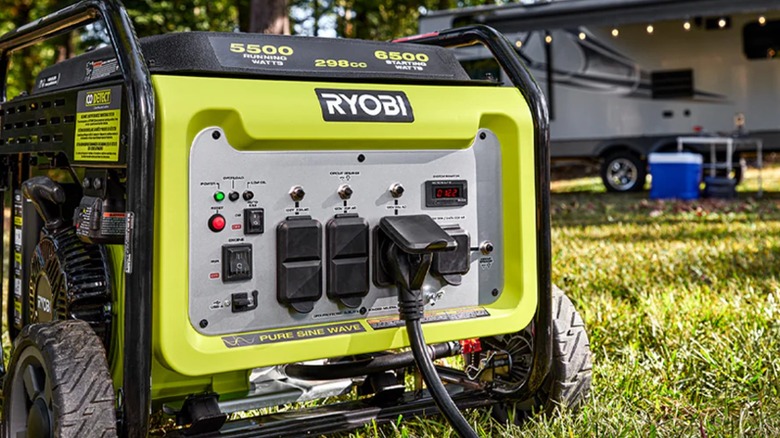Ryobi Power Source Vs Power Station Vs Generator: Key Differences, Explained
We may receive a commission on purchases made from links.
Besides its many power tools, the storied Ryobi Tools hardware brand dabbles in a few other sectors of home and jobsite work and convenience. One such sector is portable power. Portable batteries are a big part of Ryobi's overall brand identity, so it makes sense that it would use its power solutions for its own sake. Ryobi offers three broad categories of portable power: power sources, power stations, and generators.
In the broadest terms, all three of these device types do the same thing: provide electricity that other devices and appliances can draw upon, whether you're out camping, at an isolated jobsite, or in the midst of a lengthy blackout at home. While all three device types have the same end goal, though, the way they go about it and exactly how much power generation they're realistically capable of differ immensely. A power source is only intended for single, small devices, while a power station uses multiple batteries to power several devices simultaneously, and a generator utilizes gasoline to provide enough energy to light up a home.
Ryobi Power Sources and Power Stations are powered by batteries
The linchpin to most of Ryobi's hardware offerings is its proprietary battery systems, including its ONE+ line of battery packs, as well as its heftier 40V and 80V batteries for larger tools like lawn mowers. All of these battery types are used for Ryobi's various power sources, small devices built to draw power from a single compatible battery pack and deliver it to one or two other devices.
Ryobi has seven different power sources on offer: five draw power from ONE+ batteries, one draws from 40V batteries, and one draws from 80V batteries. The ONE+ models include one specifically for USB charging devices, one designed to double as a car charger, and three with single traditional outlets and USB charging plugs. The ONE+ Power Source and Charger can also be used in reverse to charge up an attached ONE+ battery. The 40V power source operates in the same manner, albeit with a larger 40V battery, while the 80V power source has two outlets that can be used simultaneously.
Ryobi's Power Sources are good for powering individual devices, but if you have a few different devices you need to power simultaneously, you might not get enough outlets or power from just a Power Source. For these situations, the next level up is a Ryobi Power Station, which uses multiple battery packs to deliver up to 1800W of power to up to three outlets and several USB chargers. All three of the Power Stations Ryobi offers deliver the same power; the differences are in power storage and form factor. The ONE+ Power Station draws power from up to eight battery packs, the Portable Power Station has a standalone internal battery, and the 40V Power Station draws from up to four 40V batteries.
Ryobi Generators use traditional gas power
Ryobi's battery-powered sources and stations are helpful for small-scale power delivery, but if you have an entire house, RV, or jobsite's worth of appliances and gadgets thirsty for juice, battery packs simply won't cut it. For those in need of enough power to keep their lights on, Ryobi offers seven models of traditional gasoline-powered generators, some of which are exclusive to Home Depot. Ryobi generators are designed to either plug directly into your home or RV's power grid to turn things on in the midst of a blackout or on the camping trail, or to sit in the middle of a jobsite for multiple power tools to draw on. They are all equipped with Ryobi's CO Detect feature, which detects ambient buildups of carbon fumes and automatically shuts off the generator at unsafe levels.
The differentiating factors between Ryobi's generators are power level and, to a lesser extent, extra features. The cheapest models include the 2300W inverter generators, one of which also comes with an 18V ONE+ electric start for quickly powering up through a ONE+ battery pack, followed by the beefier 3600W model. Above those are the 4000W models, which are largely the same, though the more expensive model is rated to last twelve hours versus eleven hours on the cheaper one. The most powerful of Ryobi's generators are the 6500W model, which runs for 8.5 hours with a four-gallon tank, followed by the 6800W model, which runs for nine hours with a five-gallon tank.


